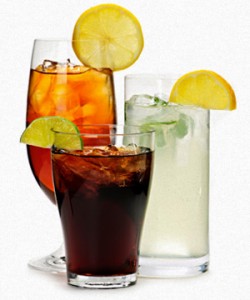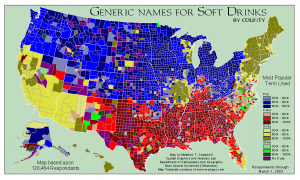If an Englishman asks you for a soda, he most probably means, specifically, soda water, or what his friend across the ocean might refer to as a club soda. But an American asking for a soda likely has another idea in mind: on these shores it usually indicates any sort of carbonated soft drink, whether it be a Pepsi, ginger ale, 7-Up, or — as the Brits might generalize — a “fizzy drink”.
But what’s the difference between British soda water and “fizzy water” (as the Brits would say when I was younger — now more often and elegantly referred to as “sparkling water”) or “seltzer”, as the Americans usually name their fizzy H2O?
In the UK, soda water contains bicarbonate of soda, which gives it a specific flavor and differentiates it from plain carbonated or sparkling water (or seltzer), making it popular as a mixer in drinks like whisky and soda or Campari soda.
In the U.S., carbonated water was known as soda water until the Second World War because of the sodium salts added as flavoring and acidity regulators to mimic the taste of natural mineral water. In the ’30s, during the Depression, it was sometimes called “two cents plain”, being the cheapest drink offered at soda fountains. The names sparkling water and seltzer water flourished during the ’50s, with the latter being a classic “genericized brand name”, much like the modern generic kleenex, hoover and biro, which all originated as trademarked names. Seltzer derives from the German town Selters, renowned for its mineral springs from which naturally carbonated water has been commercially bottled and shipped since the 18th century. Seltzer water doesn’t usually have added salts, whereas the American club soda (another brand-name-turned-generic) still often retains sodium salts, making it more akin to the British soda water. However, seltzer or seltzer water isn’t used — or even really known — in Britain and most Commonwealth countries.
Nowadays in the U.S., soda has come to mean any type of sweetened, carbonated soft drink (with soft drinks so called — across standard English — to contrast them with “hard” or alcoholic drinks). The Online Etymology Dictionary gives this potted history of the word. “Soda meaning “carbonated water” is first recorded 1834, a shortening of soda water (1802) ‘water into which carbonic acid has been forced under pressure.’ ‘It rarely contains soda in any form; but the name originally applied when sodium carbonate was contained in it has been retained’ [Century Dictionary, 1902]. Since 19c. typically flavored and sweetened with syrups. First record of soda pop is from 1863, and the most frequent modern use of the word is as a shortening of this or other terms for ‘flavored, sweetened soda water’.”
However, just to confuse matters even further: the name for fizzy soft drinks in the States varies by region. Soda and pop are the two most common American names for this broad category of beverage, but there are others, including soda pop, the British fizzy drink, and even coke, which is used generically in the South. And the word Americans choose to name their fizzies is most associated with their geographic origin or location, rather than their age, race or socio-economic status. Go fizz.
Soda is most common on the East and West Coasts, as well as in St. Louis and Hawaii. Pop tends to be the name of choice in the Midwest, the Pacific Northwest and Mountain West. According to the Online Etymology Dictionary, pop meaning “flavored carbonated beverage” dates back to 1812, and was onomatopoeic in its origin. Robert Southey in a letter of that year described his “new manufactory of a nectar, between soda-water and ginger-beer, and called pop, because ‘pop goes the cork’ when it is drawn.” In the South, coke (or cola) is used generically to name any type of soft drink—not just colas (for which coke is a common nickname) or their most famous brand representatives, Coca-Cola and Pepsi. The reason for this is quite possibly that Coca-Cola’s headquarters are located in Atlanta, Georgia, a southern state. Coke is also heard generically in neighbors of the southern states, such as New Mexico and Southern Indiana, as well as in specific areas like Trinity County, California and White Pine County in Nevada.
Popvssoda.com has published a map of the U.S. showing the generic names for soft drinks by county.
If you want further facts on this fabulously fizzy phenomenon, here’s Wikipedia‘s list of brand names of soft drinks listed by their country of origin. Aren’t you dying to know what exactly Pritty, Juizee Pop, Pschitt, Battery and Semtex (sic) are — and where they are drunk?



I just have to say, I live in Rhode Island and we call the water fountain a bubbler (bubblah even haha). There might be a few other north east states that do as well. Also we say jimmies instead of ice cream sprinkles. And of course we have coffee milk which is wicked awesome.
So interesting, Elizabeth! All new words to me. Thanks for commenting.
Louise/Glosso